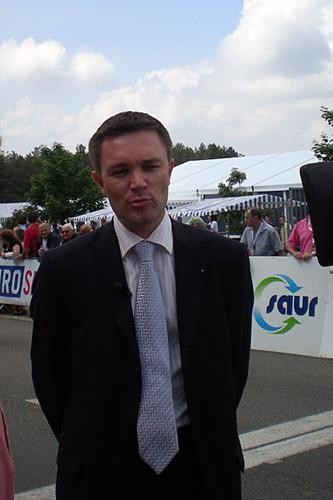French federation president criticises ASO
Lappartient hits out at domestic scene, but also foreign teams

French cycling federation (FFC) president David Lappartient has spoken out against the organiser of the Tour de France (ASO) and pointed out problems in the management of pro cycling, whether in France or abroad. Speaking to newspaper Le Monde on November 25, Lappartient explained the current dispute between the FFC and ASO regarding the payment of insurance fees, as well as calling for team managers to face doping suspensions in the future.
Lappartient had chosen not to attend the presentation of the 2011 Tour de France in October because of the disagreement. "We started negotiations with ASO to have the organisation contribute fairly to the federation's insurance contracts. At the moment, this is not the case. We started talking in October 2009 but since then, the process has stalled," said Lappartient, pointing at the higher accident risks at the Tour de France and the subsequent raise of insurance fees.
"It's a fundamental problem because it's amateur cycling that is currently paying the insurance for the Tour de France," he explained, adding that a general rift had started dividing amateur and professional cycling. On one hand, the FFC has never had as many members as in 2010, and on the other, there will be only one French team automatically admitted to the UCI World Tour events next year, AG2R La Mondiale.
"France is the 14th nation world-wide in men's road cycling. We had five teams in the ProTour four years ago, and we lost one every year. Pro cycling should help amateur cycling, because the Tour de France needs to prepare tomorrow's champions. It's been 25 years since a a Frenchman last won this race, we have never lived such a drought! But since finance has taken over the power, some subjects are not a priority," the FFC president continued. "There needs to be greater solidarity between the different families of cycling."
"Within the Junior and the Espoir ranks, we have very good results: we are amongst the three best nations world wide," said Lappartient, who evoked doping, excessive payroll charges and a certain lack of ambition as some of the factors that have led to this situation.
"Doping has played to the disadvantage of the French, who have made ethical efforts that other countries have not always made. Moreover, you have to pay 30 to 40 percent more to create a team that is one the same level than abroad, because of heavy payroll charges. We are amongst the last countries to have professional riders that have employee status within their teams, contrary to being free-lance.
"Finally, we have too much of a French approach: our riders want to do the Tour de France and shine at the national races, more than achieving results in the big races of the international calendar. The French sometimes lack ambition: some riders just settle for a pro contract and don't necessarily have further aggressiveness."
Get The Leadout Newsletter
The latest race content, interviews, features, reviews and expert buying guides, direct to your inbox!
Lappartient continued to explain that the ProTeam system of the UCI is not the only factor to blame. "It's a vicious circle: the less teams we have at the top, the less points we'll score at the races. You have to take into account the international dimension of cycling. Our calendar is very developed and may satisfy the French, but we shouldn't settle for competition amongst ourselves."
Doping suspensions for team bosses?
Finally, Lappartient called out for a more radical approach with regard to anti-doping. Even though "considerable efforts" are made within the sport, the Frenchman would like to see doping bans extended to the teams' management level.
"I think that we have to fire an important part of the team managers on an international level. When I see that some team recruit riders like [Riccardo] Ricco or [Ezekiel] Mosquera, I can only say that they have not understood a thing. Somebody like Kim Andersen, who - even if his suspension was lifted - was banned for life for three positive controls, has found a team again! It is our duty to set an example."